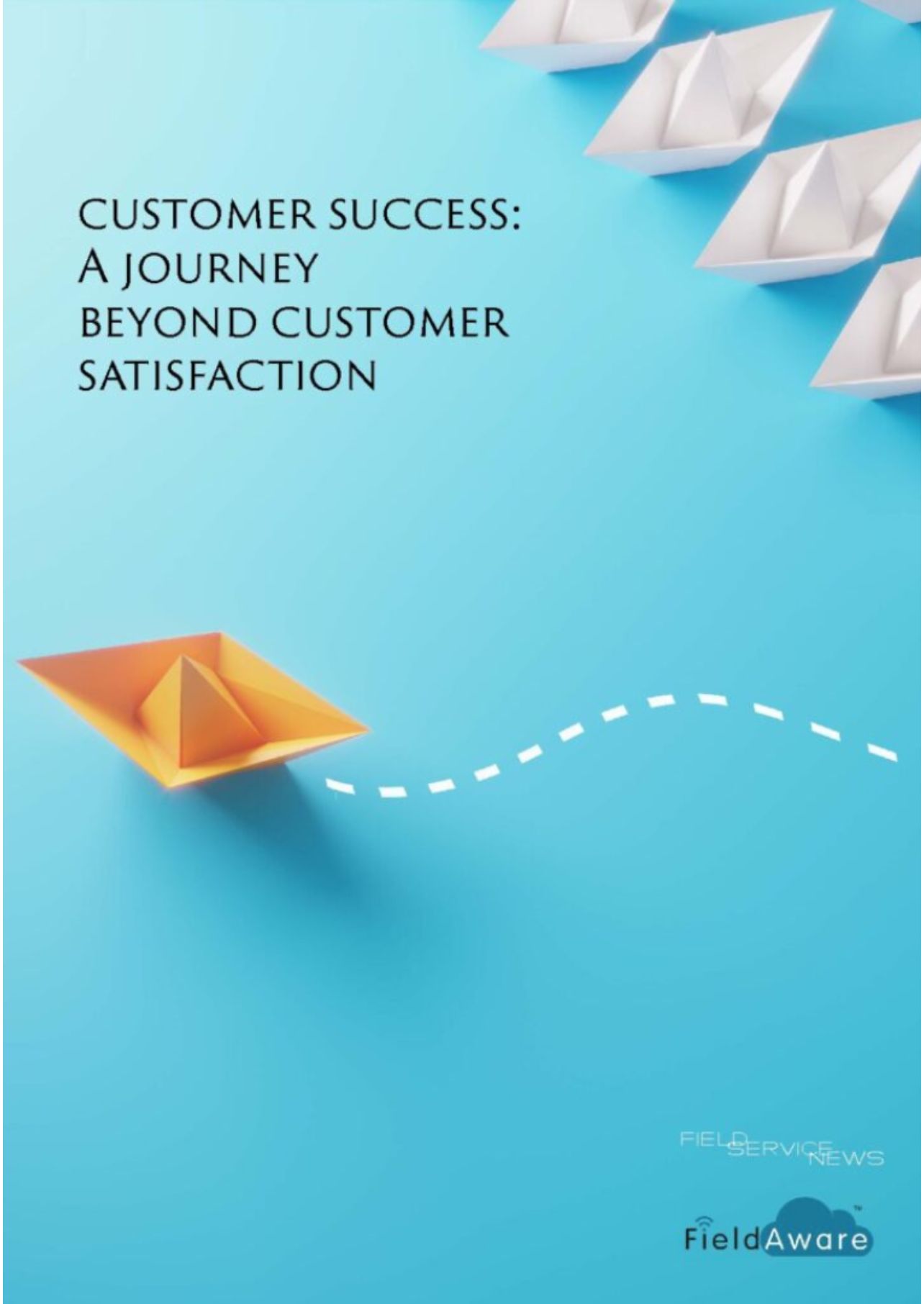How Do We Define the Difference Between a Focus on Driving Customer Satisfaction and Driving Customer Success?
How Do We Define the Difference Between a Focus on Driving Customer Satisfaction and Driving Customer Success?
In the first feature from a recent white paper we published in partnership with FieldAware, we look closely at the difference between driving customer satisfaction and driving customer success for field service organizations.
There is now little doubt that Customer Satisfaction (CSAT) metrics are viewed as a critical part of measuring effective field service operation.
This is a trend that has been becoming increasingly obvious for several years. In a 2020 Field Service News Research report, “Understanding the metrics that matter in a rapidly changing field service sector”, it was revealed that 51% of field service companies now saw an equal weighting in importance between operationally focused KPIs and CSAT-focused KPIs.
Furthermore, 13% of field service companies stated that they felt CSAT focused KPIs were of greater importance for measuring their business success.
In a more recently published Field Service News Research study, “Customer- Centricity, Technology and the New Normal of the Field Service Sector” from 2021, we saw that CSAT metrics were a crucial indicator of revenue growth metrics amongst field service organizations.
This was anticipated for growing revenue with existing clients, but interestingly, strong CSAT metrics were viewed as an essential indicator for winning new business also.
In fact, of the 293 respondents within the study, 88% stated that strong CSAT metrics were at the least a ‘very strong’ element in winning new business. 32% of the total respondents even said they were an ‘extremely important’ element.
Given the above, it is a reasonable assessment to make that the importance of strong customer satisfaction has firmly taken root within the field service sector.
Yet, increasingly those discussions centred on delivering excellent customer service are morphing into discussions centred on ensuring customer success.
The question many service leaders are asking is are the two synonymous? Is customer success a natural evolution from customer satisfaction or are the two areas related but distinctly separate (like servitization and outcome-based solutions, for example)
Perhaps to help us better understand the question, we should outline some definitions of customer success.
CRM and CMS provider and specialist platform for inbound marketing software HubSpot defines customer success as follows:
“Customer success is anticipating customer challenges or questions and proactively providing solutions and answers. Customer success helps you boost customer happiness and retention, thus increasing your revenue and customer loyalty.”
The Customer Success Association however define customer success as “a long- term, scientifically engineered and professionally directed business strategy for maximizing customer and company sustainable proven profitability.”
A third definition provided by Gartner is “Customer success is a method for ensuring customers reach their desired outcomes when using an organization’s product or service. A relationship-focused customer success strategy includes involvement in the purchase decision, implementation and use of products or services and customer support.”
If we look at each of these definitions, we can see why many are confused regarding the difference between CSAT and customer success.
The first definition from HubSpot doesn’t seem to stray too far from good customer service, the foundation of customer satisfaction. Within this definition, the two terms could indeed be interchangeable.
The second definition from the Customer Success Association comes across as something of a buzz-word salad – with phrases smashed together, leaving the average reader with little additional insight into what the term means and even potentially adding more confusion into the mix.
Finally, as we look towards the Gartner definition, we find something we can begin to utilize as we seek an answer to our question.
Within Gartner’s definition, we can see that customer success is more than meeting or even anticipating customer requirements as we saw in the first definition, but instead has an understanding of the customers end goas and establishes a path to achieving these utilizing the organizations own service or product.
Within our industry, a considerable amount of discussion for the last few years has centred around servitization and outcome-based service models.

 Data usage note: By accessing this content you consent to the contact details submitted when you registered as a subscriber to fieldservicenews.com to be shared with the listed sponsor of this premium content FieldAware who may contact you for legitimate business reasons to discuss the content of this briefing report.
Data usage note: By accessing this content you consent to the contact details submitted when you registered as a subscriber to fieldservicenews.com to be shared with the listed sponsor of this premium content FieldAware who may contact you for legitimate business reasons to discuss the content of this briefing report.
This content is available for FSN PRO members and also for a limited period for FSN FREE members. Please make sure you are logged in to access this content.
"Outcome-based solutions are certainly one end-point of servitization, but if we viewed servitization as a spectrum of advanced service design rather than the traditional linear perspective, could the customer success methodology sit somewhere else on that same spectrum?"
Reading through Gartner’s customer success definition, it could be viewed that customer success could and perhaps should be included within the increasingly broad umbrella of servitization.
As the continuing academic research and literature into servitization grows alongside the case studies of successful servitization, the existing model of servitization being a series of steps that lead towards a goal of outcome-based solutions is perhaps outdated.
Outcome-based solutions are certainly one end-point of servitization, but if we viewed servitization as a spectrum of advanced service design rather than the traditional linear perspective, could the customer success methodology sit somewhere else on that same spectrum?
Suppose we break down the difference between outcome-based service and customer success methodology. In that case, there are certainly plenty of aspects that are shared. It could be argued that the final responsibility for the delivery of the outcome is the only true differentiator.
Indeed, an intimate understanding of the end goal shared with the customer and the service provider is required in both service models.
Equally, while CSAT is a solid foundation to begin building towards any form of servitized offering, the leap from CSAT to a customer success based model is arguably as significant as it would be to an entirely outcome-based offering.
In the next feature from this white paper, we shall explore why…
Do you want to know more?
If you are already a subscriber you can access the report instantly on the ‘read now’ button below.
If you are yet to subscribe simply click the button below and complete the brief registration form to subscribe and you will get instant access to this report plus a selection of premium resources.
This content is available for FSN PRO members. Please make sure you are logged in to access this content.

 Data usage note: By accessing this content you consent to the contact details submitted when you registered as a subscriber to fieldservicenews.com to be shared with the listed sponsor of this premium content FieldAware who may contact you for legitimate business reasons to discuss the content of this briefing report.
Data usage note: By accessing this content you consent to the contact details submitted when you registered as a subscriber to fieldservicenews.com to be shared with the listed sponsor of this premium content FieldAware who may contact you for legitimate business reasons to discuss the content of this briefing report.


